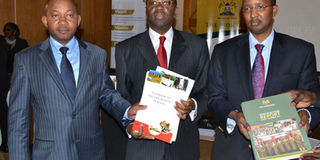Chief Justice Willy Mutunga admits courts cannot please all in election disputes

(From L to R) Law Society of Kenya chairman Eric Mutua, Chief Justice Dr Willy Mutunga and Independent Electoral and Boundaries Commission chairman Isaack Hassan during the launch of the Handbook on Election Disputes in Kenya at the Intercontinental Hotel, Nairobi, on November 29, 2013. PHOTO | JEFF ANGOTE
What you need to know:
The CJ said courts could not satisfy everybody in an election dispute
Dr Mutunga said conducting a peaceful election, and peacefully resolving the disputes that arise from them, are important markers of a maturing democracy
Chief Justice Willy Mutunga has said he has no regrets over the Supreme Court’s decision that reaffirmed President Uhuru Kenyatta’s win in the March 4 General Election.
Dr Mutunga also proposed that there should be an alternative political mechanism to resolve election disputes instead of relying on courts.
The CJ said courts could not satisfy everybody in an election dispute in a country which is divided based on ethnicity, tribe, clan, race, religion, class and culture.
Dr Mutunga was speaking during a debriefing of advocates and the launch of the Handbook on Election Disputes in Kenya at a Nairobi hotel. He also said the election disputes were denting the image of the Judiciary which the country has been trying to build since 2007.
"How do you expect the court to decide a dispute and losers say they are satisfied? How do you expect court to convince the loser that there was justice?" Dr Mutunga said.
He said there should be a political tribunal to address differences during elections and a decision reached through a culture of elite consensus to save the Judiciary from damage.
Dr Mutunga’s remarks came after Law Society of Kenya Chairman Eric Mutua said lawyers were unhappy with the way the Supreme Court, of which Dr Mutunga is President, handled the presidential election petition.
“The bar feels it should have been handled in a different manner,” Mr Mutua said, but also conceded that the Judiciary had done a commendable job in handling other electoral disputes.
The LSK boss said the speed in which the electoral petitions were concluded should be replicated in other civil matters to fasten delivery of justice.
Dr Mutunga said conducting a peaceful election, and peacefully resolving the disputes that arise from them, are important markers of a maturing democracy.
“This is playing politics under the four corners of the rule of law, and we must not take it for granted. All institutions and actors in Kenya’s 2013 electoral processes must fortify the positives of this experience, learn from and eliminate the lapses that may have occurred, and in consequence enrich our constitutional democracy,” Dr Mutunga said.
The electoral dispute resolution processes in the trial courts ended in October. The appellate process began in earnest thereafter and now the focus has shifted to the appellate courts.
“We at the Judiciary are pleased with the management of the electoral dispute resolution process. The handling of the disputes within the timelines set is a constitutional victory for the Judiciary and our country at large,” Dr Mutunga said.
IEBC CHALLENGES
The Independent Elections and Boundaries Commission chairman Issack Hassan said there’s no election without an element of dispute.
He however said the disputes over the March 4 election was not a reflection of IEBC’s weakness.
Mr Hassan said the high number of election related disputes after the March polls was as a result of increased public understanding of the available redress.
The IEBC has been under criticism from a section of Kenyans led by the Coalition for Reforms and Democracy (Cord) leader Raila Odinga over the handling of the March 4 elections that was marred with breakdown of equipment and other irregularities.
The Supreme Court has also been under attack for re-affirming the IEBC’s declaration of President Kenyatta as the winner of the March 4 presidential polls with a slight margin against his main rival, Mr Odinga.
Mr Hassan said the biggest challenge IEBC had was dealing with the timelines following the 10th Parliament's amendments that put party primaries too close to the General Election.
He also criticized late court appeals decisions and injunctions saying they led to loss of taxpayers money.
In March, Mr Hassan declared Mr Kenyatta the winner of the presidential election with 6,173,433 votes against Mr Odinga’s 5,340,546 but the Cord leader challenged the decision in court saying IEBC had rigged the polls in favour of the Jubilee leader.
Mr Kenyatta surpassed the constitutional requirement of 50% + 1 vote by 4,100 votes which saw him get 50.07 per cent of the votes.
The Supreme Court headed by Dr Mutunga ruled on March 30 that President Kenyatta was “validly elected in a free, fair, transparent and credible election.”
The constitution stipulated that the dispute was to be resolved within 14 days and Dr Mutunga’s team had only five days to review the petition and make a ruling.
The actual one-page ruling was written and signed by the six Supreme Court judges at the time and took less than 10 minutes to be read to Kenyans.
The Supreme Court rejected Mr Odinga’s 900 page petition on grounds that it was time barred. The first issue that was determined was whether then President-elect Uhuru Kenyatta and Deputy President-elect William Ruto were validly elected.
The Handbook on Elections Disputes is intended to contribute to the debate on elections, secure credible and fair dispute resolution mechanisms for future elections, equip both the Bench and the Bar with a broad understanding of the constitutional and legal framework that governs elections in Kenya, particularly electoral disputes and aid in electoral dispute resolution by providing an analysis of the existing jurisprudence.





